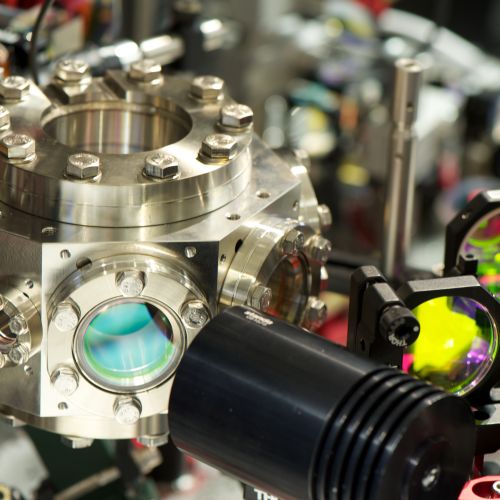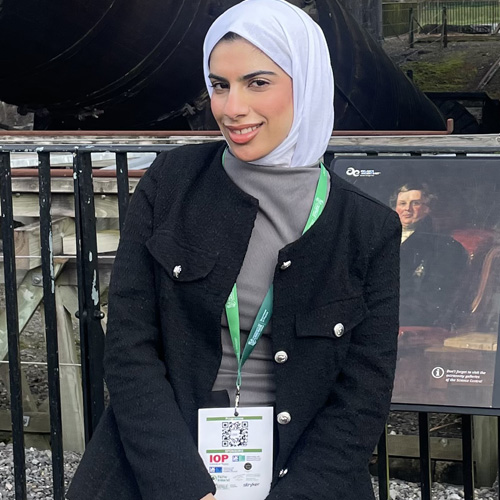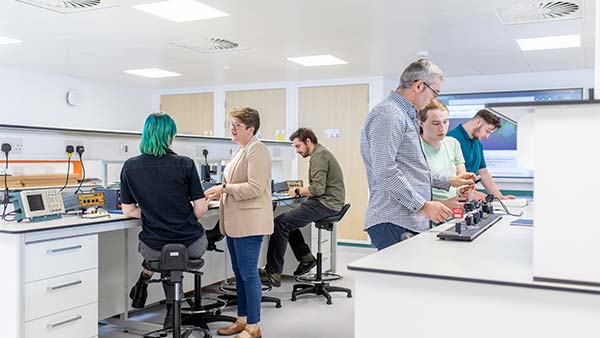BSc Hons Physics with Teaching (International)
ApplyKey facts
Open to: international applicants only
Ranked: 1st in the UK for Physics by the Daily Mail University Guide Subject Tables 2025
Work placement: bespoke placement experiences in year 4
Study with us
Our Physics with Teaching (International) BSc Honours programme allows you to explore your own interests in physics while training you to share it with others. This vocational programme combines the core of physics content and skills with the knowledge and experience that will allow you to step into a fulfilling career in education.
- core of physics taught by enthusiastic world-leading researchers within a friendly and supportive environment
- integrated maths curriculum; taught by physicists for physicists
- build proficiency in theoretical, experimental and computational physics developed throughout the programme
- develop your practical skills in our recently refurbished accessible experimental laboratories
- combine physics with teaching methods and practice to prepare you to be a physics teacher in secondary schools
- curriculum specifically designed for international students
- learn with Scotland’s largest provider of Initial Teacher Education
The Place of Useful Learning
UK University of the Year
Daily Mail University of the Year Awards 2026
Scottish University of the Year
The Sunday Times' Good University Guide 2026
Why this course?
If you are naturally curious, want to communicate that curiosity and support the next generation of physics students, this course will prepare you to teach in the secondary section.
Our physics curriculum is influenced and delivered by our world-leading academics who bring their passion for cutting-edge science to all aspects of their teaching. From lectures and workshops to state-of-the art laboratories, corresponding computer classes, you will find a challenging and engaging portfolio to dive into.
In year 4, you will join The Strathclyde Institute of Education for modules designed to give you a background in how children learn and how to manage a classroom. You will also complete complete bespoke placement experiences with children and young people in Scottish schools. Our department offers support to our international physics students, helping you to become part of our diverse community.


What you'll study
Year 1
Department of Physics staff will deliver the foundations of physics, mathematics and problem solving to establish a strong base for future learning. We start with essential mechanics, waves and fundamental electromagnetism and quantum physics all supported by a bespoke mathematics course. You’ll be introduced to the programming language python and practical work in the teaching laboratory will give you the basic skills you need to complete and report on your first mini-project. You will also develop your personal and professional skills through a through a mini team project and begin to interact with the careers service.
Year 2
Next we support you to create a foundation for complex concepts and build on the previous year’s topics. The bespoke mathematics course, delivered by physicists, continues to help you tackle problems and apply concepts across mechanics, waves, electromagnetism and quantum physics. You’ll start developing computational physics models in python and the practical course will extend your ability to use a variety of equipment and enhance your experimental skills. Classes and team assignments will further develop your communication, negotiation and leadership skills.
Year 3
Extending the concepts from year 1 and 2, you’ll start to relate the physics of mechanics, waves, electromagnetism and quantum physics to the intricacies of the quantum realm, thermodynamics and solid-state physics. You will apply your problem-solving skills to more sophisticated theoretical, computational and experimental challenges and you will get to choose optional modules to extend your knowledge in these areas. Dedicated activities will support you to communicate challenging ideas to non-specialists and prepare you for year 3 and future careers.
Year 4
In this year you will move from the Department of Physics and take classes that develop your understanding of teaching.
Alongside these classes, a major part of year 4 in The Strathclyde Institute of Education is bespoke placement experiences with children and young people in Scottish schools. These placement experiences are undertaken in both semester 1 and semester 2.

What I love most about my course is the blend of theory and practical application. Studying physics at Strathclyde excites me, especially in the labs, where hands-on experience deepens my understanding.
Chat to a student ambassador
Want to know more about what it’s like to be a Science student at the University of Strathclyde? A selection of our current students are here to help!
Our Unibuddy ambassadors can answer all your questions about courses and studying at Strathclyde and offer insight into their experiences of life in Glasgow and Scotland.

The opportunity to engage in a placement within Scottish schools during this final year is particularly valuable. It provides a hands-on experience that allows me to apply what I have learned in a real-world classroom setting, bridging the gap between theory and practice.
Experimental Physics (20 credits)
This module is an introduction to working in a laboratory environment. You'll learn how to design and undertake simple experiments related to the taught components of the first-year physics curriculum. By the end of the course you will be able to write a formal report, perform simple uncertainty analysis, make dimensional analysis of physical systems, and perform simple data analysis with Python
Mechanics & Waves (20 credits)
This module will provide you with an understanding of motion of simple mechanical systems, gravitation and simple harmonic motion. You'll also learn about the fundamentals of wave propagation and the superposition of waves as well simple optical phenomena such as diffraction.
Quantum Physics & Electromagnetism (20 credits)
This module is designed to introduce you to quantum mechanics and electromagnetism. It highlights experimental observations that resulted in the development of quantum mechanics, such as the photoelectric effect and blackbody radiation. In terms of electromagnetism, you'll cover basic electrostatics and magnetostatics and develop an understanding of Maxwell’s equations and the Lorentz force law.
Mathematics (40 credits)
We will introduce you to the mathematics necessary to support the physics curriculum. The modules will cover topics ranging from differentiation and integration, complex numbers, an introduction to linear algebra and vectors. You will learn how to apply your mathematical knowledge to related problems in physics.
Computational & Physics Skills (20 credits)
This module will introduce you to the Python programming language and you will start to use Python to write simple programmes to model physical systems. You will also develop your study and communication skills, and interact with the careers service to develop your employability skills. This module will involve a group project.
Experimental Physics (20 credits)
This module is an extension of Experimental Physics from year 1. You'll undertake more complex experiments that are related to the taught components of the second-year curriculum. You'll see the statistical origin for experimental uncertainties.
Mechanics, Optics & Waves (20 credits)
This module builds on Mechanics and Waves from year 1. You'll be introduced to special relativity, the vector treatment of rotational motion and the behaviour of systems when forced to oscillate. To extend your understanding of wave phenomena you'll be introduced to the wave equation, Fresnel and Fraunhofer diffraction, interference, geometrical optics, and the operation of lasers.
Quantum Physics & Electromagnetism (20 credits)
This module builds on the material you learned in year 1. You'll be introduced to the probabilistic nature of quantum mechanics, including wave particle duality and Heisenberg uncertainty principle. You'll learn about AC theory, covering inductors, capacitors and transmission lines. You’ll extend your knowledge of Maxwell’s equations to develop a vector model of electromagnetism and the theory of the plane electromagnetic wave in vacuum.
Mathematics (40 credits)
The topics covered in these modules will extend the mathematics seen in first year. You will cover many different topics including probability distributions, ordinary and partial differential equations, Fourier series and transforms, linear algebra, and complex variables. You will learn how to solve problems relating to the topics covered in your physics modules and build appropriate physical models.
Computational & Physics Skills (20 credits)
In this module you will build on the Python programming seen in year 1 and be introduced to a range of computational techniques that will make modelling and solving physical system straightforward. Again there will be a group project which will be used to enhance your skills and there will be further interactions with the Careers Service to enhance your employability skills.
Experimental Physics I & II
These classes extend the laboratory work developed in years 1 and 2 to cover new content developed in the Year 3 syllabus. Experimental Physics I has twice the content of Experimental Physics II and allows students the option of focusing more on experimental physics. In these classes the laboratory work is open ended so you're able to fully explore the experiments in preparation for the final year project.
Quantum Physics & Electromagnetism (20 credits)
Building on what you learned in year 2, this module will extend your understanding of quantum mechanics. We'll introduce operators, expectation values and commutation relationships, and advanced concepts like time independent perturbation theory. In electromagnetism you will exploring the wave like nature of electromagnetism as predicted by Maxwell's equations, Poynting’s theorem, reflection and transmission at a dielectric interface, potentials and gauge transformations, and retarded potentials.
Communicating Physics
This class will help develop your knowledge base and transferable skills in preparation for the project undertaken in year 4 of the course. It focuses on oral, written and graphical presentations, literature and group-work skills, individual data analysis and interpretation skills, and basic grounding in physics problem solving.
Condensed Matter Physics (20 credits)
Here you'll cover binding forces in solids, bulk material properties, phonons and other forms of collective excitations, crystal structure, elementary concepts of band structure, semi-conductors, magnetic materials and the origins of magnetism, and superconductors.
Gases, Fluids & Thermodynamics
This class covers the fundamentals of gases and fluids and leads on to classical, statistical and quantum thermodynamics describing properties such as entropy, Fermi-Dirac and Bose-Einstein behaviour in matter.
Computational Physics
The computational skills developed in Years 1 & 2 will be applied to real life physics problems and the methods used to solve them including a wide range of methods and algorithms to solve systems of partial differential equations, Monte-Carlo simulations, the finite difference method, stochastic behaviour, as well as introducing best-practise in software development.
Mathematical Physics
This class will introduce mathematical problem-solving techniques for advanced problems from Quantum Mechanics, Statistical Mechanics and Thermal Physics, Solid State Physics, and Electrodynamics. New techniques will also be introduced focusing around classical mechanics and elements of mathematics that are transferable to a wide range of physics problems.
Educational Studies: Professional Values (20 credits)
This class will explore the theoretical underpinnings of education: its nature and purpose, its ethical and political significance in terms of social justice, equality and the environment, and the expression of these ideas in policy and legislation.
Professional Learning Through Enquiry (20 credits)
Professional Learning through Enquiry aims to develop students as enquiring, self-reflective practitioners who are able to work collaboratively to develop skills, knowledge and expertise in an area of professional practice that will benefit children and young people throughout Scotland and beyond.
Professional Skills: Curriculum and Pedagogy Physics 1 (40 credits)
The class will provide active and collaborative opportunities for students to explore how to plan discrete, integrated, and interdisciplinary curricular learning with a particular focus on the teaching of physics and general science.
Placement Learning: Community (20 credits)
This module aims to provide students an opportunity to engage with their peers and learners of STEM in a variety of situations on and off campus. This will give them a real life context in which they can relate their ideas learned in their Physics with Science curriculum and pedagogy classes.
Learning on Placement (20 credits)
This module aims to give students an opportunity to apply knowledge and skills in STEM pedagogical methods gained on this as well as other course modules to help learners in a variety of situations and institutions.
Learning & teaching
Teaching methods include lectures, tutorials, interactive learning using both personal response systems and web-based teaching resources, directed and open-endd laboratory work, group-based learning and self-paced project work.
Assessment
Assessment methods include exams, continuous assessment, written reports, moderated peer assessment in tutorials and workshops, talks and poster sessions.


Facilities
Our sunlit (and completely dark!) experimental laboratories have recently undergone a multimillion-pound refurbishment.
Take a closer look at our physics labs and get a virtual tour from Dr Helen Vaughan.
Entry requirements
| A Levels | Year 1 entry: BBB (Physics B, Mathematics B, GCSE English Language 4/C and Literature 4/C) |
|---|---|
| International Baccalaureate | Standard entry requirements*: Year 1 entry: 30 |
| International students | View the entry requirements for your country. |
Additional information
Membership of the Protecting Vulnerable Groups Scheme required is required for Year 4.
Pop Physics!
Our students work with the Institute of Physics to carry out experiments demonstrating some of the core principles of physics and how they relate to our lives and the world around us.
Take a look at the videos on YouTube to learn more about physics!
Fees & funding
All fees quoted are for full-time courses and per academic year unless stated otherwise.
Fees may be subject to updates to maintain accuracy. Tuition fees will be notified in your offer letter.
All fees are in £ sterling, unless otherwise stated, and may be subject to revision.
Annual revision of fees
Students on programmes of study of more than one year (or studying standalone modules) should be aware that the majority of fees will increase annually.
The University will take a range of factors into account, including, but not limited to, UK inflation, changes in delivery costs and changes in Scottish and/or UK Government funding. Changes in fees will be published on the University website in October each year for the following year of study and any annual increase will be capped at a maximum of 10% per year. This cap will apply to fees from 2026/27 onwards, which will not increase by more than 10% from the previous year for continuing students.
| International | £29,350 |
|---|---|
| University preparation programme fees | International students can find out more about the costs and payments of studying a university preparation programme at the University of Strathclyde International Study Centre. |
| Available scholarships | Take a look at our scholarships search for funding opportunities. |
| Additional costs | Course materials & costs: At present, the department charges students £5 for lecture notes in PH 151 and PH 152. These notes are supplied by the University printers. Digital copies of notes are published on MyPlace for students to download. A recommended textbook that comes with an online homework system is priced at £75 and covers both first and second-year material. If students don't wish to buy this text, the department issues the homework in paper copy for students to hand in for marking. This process is currently under review, as the department are considering moving to an online textbook. This will be priced at £30 and accessed through MyPlace. Other costs: The department supplies students with lab books (£1) for recording data through years 1-3. First-year students are supplied with USB keys (£10) for the collection of data. Personal response handsets are also available at lectures. Visa & immigration: International students may have associated visa and immigration costs. Please see student visa guidance for more information. |
Please note: All fees shown are annual and may be subject to an increase each year. Find out more about fees.
How can I fund my studies?
International Students
We have a number of scholarships available to international students. Take a look at our scholarship search to find out more.
International students
We've a thriving international community with students coming here to study from over 140 countries across the world. Find out all you need to know about studying in Glasgow at Strathclyde and hear from students about their experiences.

Careers
Graduates will have developed the skills required to teach physics in secondary schools.
Graduates will also have developed skills applicable to creating, setting up and demonstrating experiments commonly carried out in secondary school physics labs.
Apply
This degree programme is only available to international students. UK students should apply to our BSc (Hons) Physics with Teaching degree course.
Start date: Sep 2026
(1 year entry)
Start date: Sep 2026
(2 year entry)

